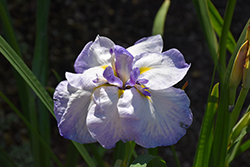Height: 4 feet
Spacing: 18 inches
Sunlight:
![]()
![]()
Hardiness Zone: 4a
Other Names: Japanese Water Iris, Russian Iris, Japanese Flag
Ornamental Features
Butterflies In Flight Japanese Iris has masses of beautiful white flag-like flowers with purple overtones and a gold blotch at the ends of the stems from mid spring to early summer, which are most effective when planted in groupings. The flowers are excellent for cutting. Its sword-like leaves remain green in colour throughout the season.
Landscape Attributes
Butterflies In Flight Japanese Iris is an herbaceous perennial with tall flower stalks held atop a low mound of foliage. Its medium texture blends into the garden, but can always be balanced by a couple of finer or coarser plants for an effective composition.
This plant will require occasional maintenance and upkeep, and should be cut back in late fall in preparation for winter. It is a good choice for attracting butterflies to your yard, but is not particularly attractive to deer who tend to leave it alone in favor of tastier treats. Gardeners should be aware of the following characteristic(s) that may warrant special consideration;
- Insects
Butterflies In Flight Japanese Iris is recommended for the following landscape applications;
- Mass Planting
- General Garden Use
- Bog Gardens
Planting & Growing
Butterflies In Flight Japanese Iris will grow to be about 3 feet tall at maturity, with a spread of 24 inches. When grown in masses or used as a bedding plant, individual plants should be spaced approximately 18 inches apart. The flower stalks can be weak and so it may require staking in exposed sites or excessively rich soils. It grows at a medium rate, and under ideal conditions can be expected to live for approximately 10 years. As an herbaceous perennial, this plant will usually die back to the crown each winter, and will regrow from the base each spring. Be careful not to disturb the crown in late winter when it may not be readily seen!
This plant does best in full sun to partial shade. It prefers to grow in moist to wet soil, and will even tolerate some standing water. It is not particular as to soil type, but has a definite preference for acidic soils. It is somewhat tolerant of urban pollution. This is a selected variety of a species not originally from North America. It can be propagated by division; however, as a cultivated variety, be aware that it may be subject to certain restrictions or prohibitions on propagation.
Disclaimer - This resource is provided for informational purposes only and does NOT reflect current availability. Inventory varies seasonally, so we cannot guarantee that every plant will be in stock at all times - please contact your favourite GardenWorks location directly for current availability. It does not include our entire inventory of plants, so be sure to visit GardenWorks to see varieties that may not be represented on this list.

